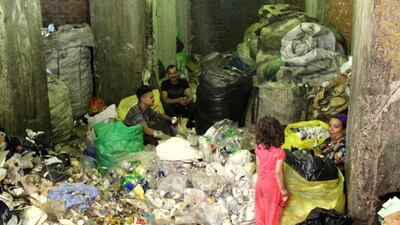CAIRO // Sitting on one of the piles of rubbish lining an alleyway on a recent afternoon, Antonio Bakhit watched fellow workers toil amid the squalor and uncertainty that he dreams of escaping.
Like most residents of the slums in Manshiyat Naser neighbourhood, Mr Bakhit, 20, is a member of the Coptic Christian community that has for decades scraped a living by collecting and recycling Cairo’s vast quantities of garbage.
Although marginalised by the state and in an uneasy coexistence with Egypt's Muslim majority, Mr Bakhit and his fellow Zabbaleen, or garbage people, nonetheless continue to perform a vital if thankless service.
The Zabbaleen have felt increasingly vulnerable in the political and economic turmoil following the 2011 revolution that removed Hosni Mubarak from power.
Mr Bakhit, who holds a diploma in business administration, says the upheaval has threatened his ambition “to open a business one day”.
Because of worsening economic conditions, he earns less than Dh40 a day sorting through plastic bottles and food waste alongside his mother, father and five siblings.
But the presidential election next week, in which the former defence minister and army chief Abdel Fattah El Sisi is the frontrunner, has given them hope, they say.
“The economy is broken and the security situation is bad,” he said. “That’s why we need order in Egypt, a strong leader.”
Many Egyptians express similar sentiments. Large numbers of citizens backed the military’s removal last summer of their first democratically elected president, Mohammed Morsi, and the subsequent crackdown on his Muslim Brotherhood organisation.
Hundreds of Brotherhood supporters were killed in clashes and thousands arrested as the subsequent military-installed government cracked down on protests against Mr Morsi’s removal.
The government declared the pan-Islamist group a terrorist organisation in December after a series of attacks on security forces.
Many Egyptians have since rallied around Mr El Sisi, who is campaigning on a platform of stability and national cohesion.
That may explain why the mention of Mr El Sisi, who as head of the armed forces played a leading role in removing Mr Morsi, evokes strong support in Manshiyat Naser.
Backing for the former defence minister seems almost unanimous in this flyblown warren of four-storey, mud-brick buildings where most residents sift through the city’s rubbish for items to recycle and sell.
“We love Sisi – he is a strong man who loves Egypt!” said Sarwan Sarid, 23, a chicken seller. His dilapidated storefront is covered with posters of Coptic popes and church iconography and, like many here, his arms are tattooed with religious symbols.
“We need a military man like Sisi to run this country,” he said.
The support may partly be linked to the military’s reputation among large sections of Egyptian society as a guarantor of security and stability that will help to revive an economy hit hard by falling tourism revenues and rising unemployment over the past three years.
But for the roughly 70,000 Zabbaleen and Coptic Christians elsewhere in the country, who comprise about 10 per cent of Egypt’s population of 80 million, backing Mr El Sisi also may also be rooted in sectarian concerns, said Monir Megahed, the coordinator of Masryoun Against Religious Discrimination, a non-governmental organisation that promotes religious tolerance.
After the 2011 revolution, a spate of religiously motivated attacks that were linked to Islamists left many Christians deeply uncomfortable with the Muslim Brotherhood's politics.
“They are afraid of the Muslim Brotherhood because they suffered a lot during and after their reign, because of the burning churches and kidnapping of people and so on,” said Mr Megahed.
Residents of Manshiyat Naser recall with horror an attack in March 2011 involving residents from a nearby neighbourhood in which a dozen Muslims and Zabbaleen were killed. As mobs looted Christian homes, residents at the time accused the military of not doing enough to stop the violence.
While public criticism of the armed forces has since stopped, the Zabbaleen resent what they see as unfair treatment by authorities that has existed long before the rise of the Muslim Brotherhood.
During the nearly 30-year rule of Mr Mubarak, the state failed to provide them with public utilities such as water and electricity. And during the 2009 swine-flu pandemic, his government culled about 300,000 pigs, many of them owned by the Zabbaleen, despite scientific evidence that there was no link between the animals and transmission of the virus.
The Zabbaleen used the organic waste they collect to feed their livestock, including pigs, which they then sold to local hotels and restaurants.
Youssef Sidhom, editor in chief of the weekly newspaper Al Watani, which has a large Coptic Christian readership, said the Zabbaleen were “hit hard by the ruining of their business of pig breeding”.
“They were broke after that. Out of business.”
The culling of the pigs also generated a rubbish crisis in Cairo, causing garbage to pile high on the capital’s streets because the Zabbaleen no longer had any need to collect organic waste.
Although the Zabbaleen’s pig rearing has recovered slightly, many say Cairo’s rubbish collection still suffers from the government’s decision to meddle in a system that the community devised in the 1940s and was known for its efficiency.
Unloading bags from a rickety lorry that had just returned from a rubbish-collection run in the city, Mr Bakhit and his family voice hopes that the future will be less turbulent than recent years.
His mother, Umm Karim, 38, wants a return to the days when collecting rubbish was more lucrative, before the pig cull slashed their earnings. Another family member, a cousin, wants to become a singer.
Mr Bakhit, for his part, wants to sell mobile phones.
But all of them want stability, which Mr Bakhit said is embodied by the military and Mr El Sisi.
“He will deliver stability because he’s a military, man and the military knows how to deal with the people,” he said.
hnaylor@thenational.ae

